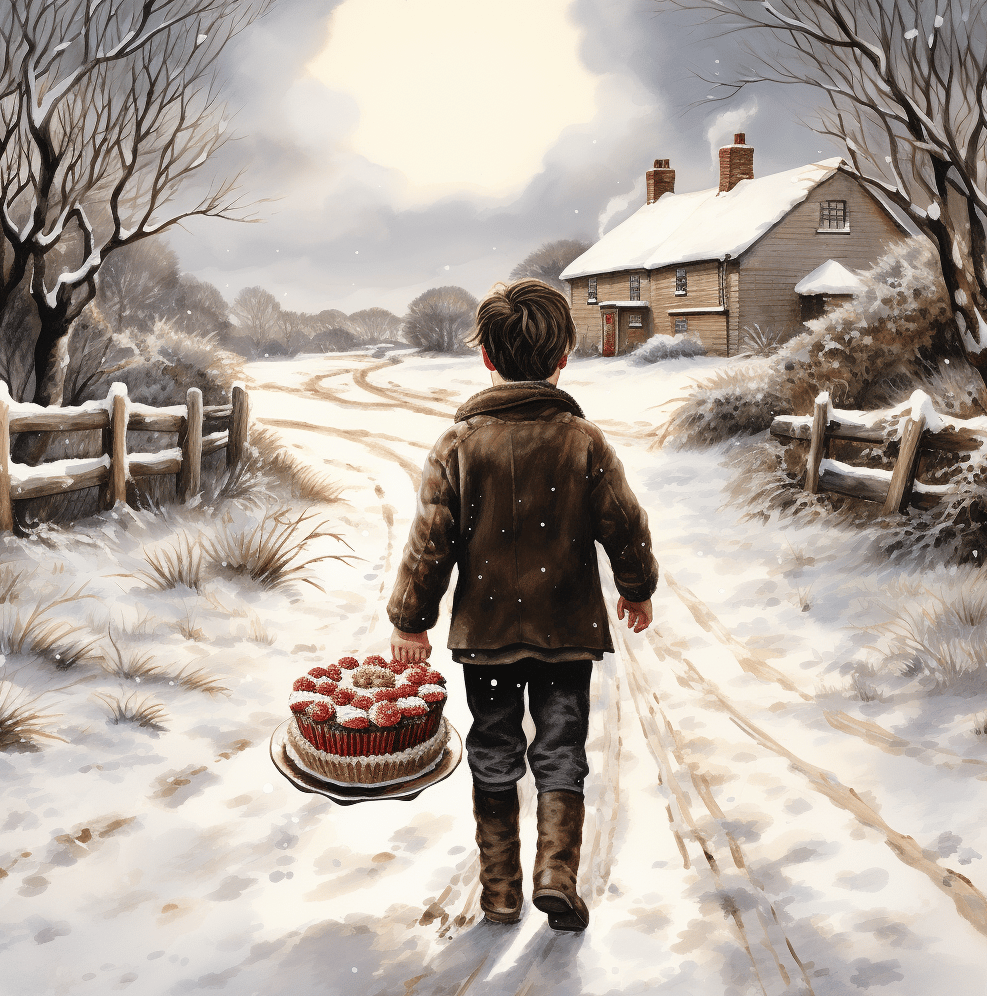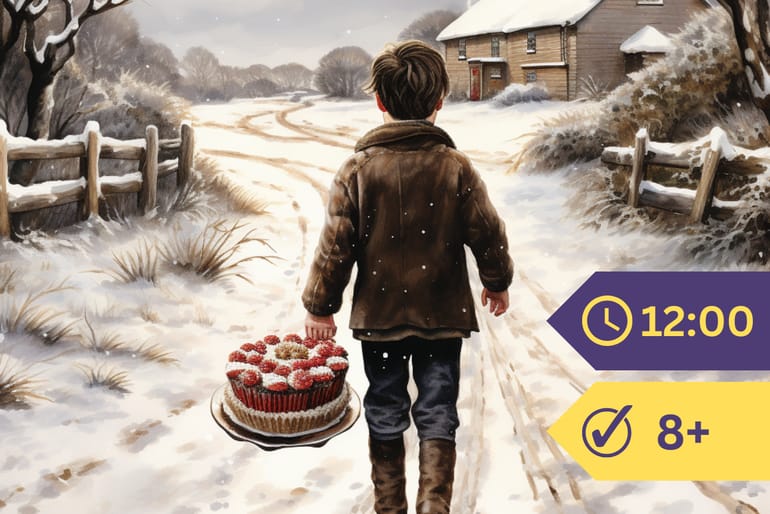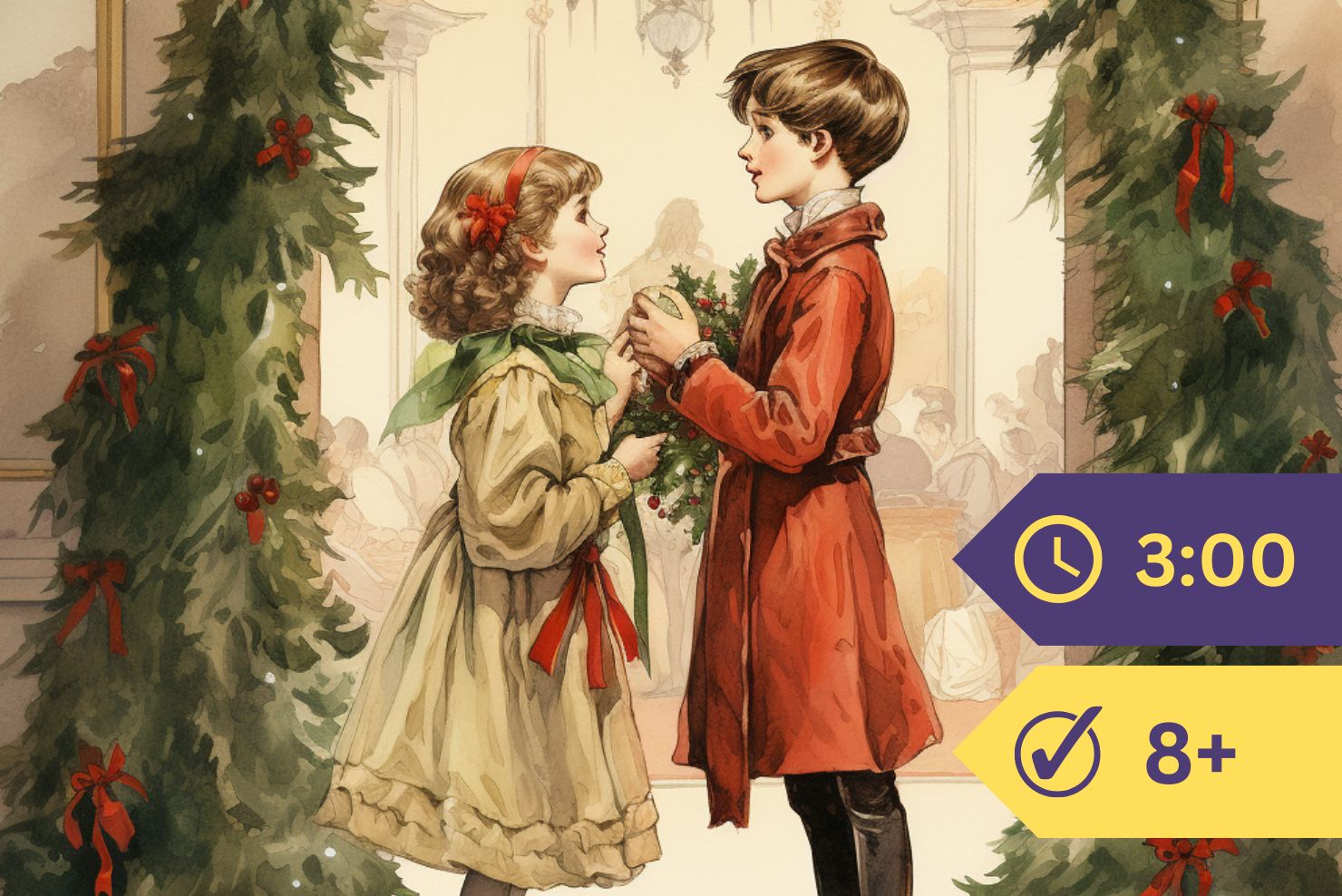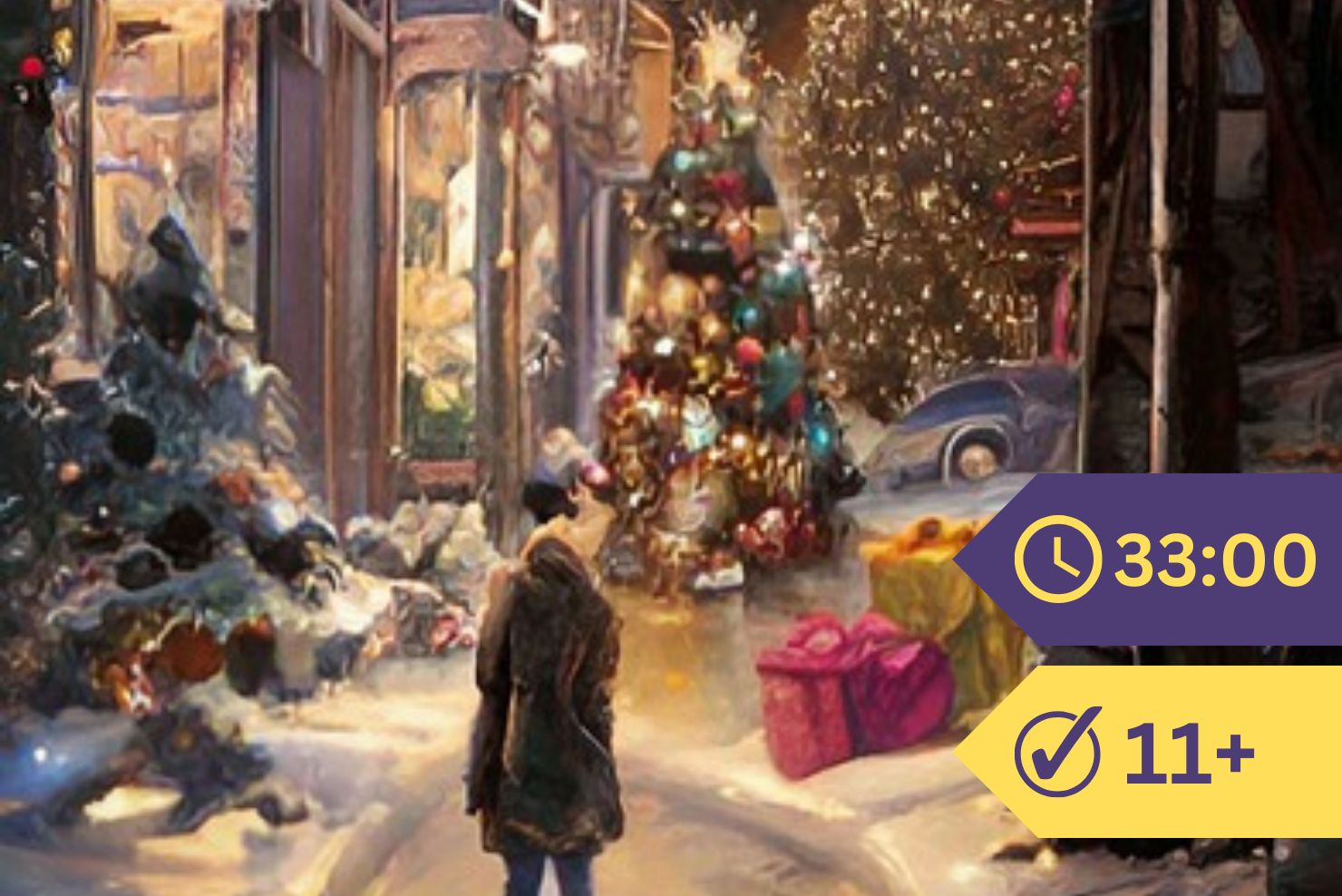Once upon a time, an old wife who lived in the village here had the thought to send a Christmas cake to her sister who lived in another village.
“It will be a rare treat for the poor soul,” said she, “for it’s true that another’s baking has a better taste than what comes from a body’s own oven, though the difference between the two may be no more than a grain of salt.” And she set to work to make the cake.
What she put into the cake is a long story, for there was flour of the finest, and sugar of the sweetest, and spices of every kind; fresh yellow butter, creamy milk, plums as large as a man’s thumb, and yeast, the secret of which no one knew but herself; and all mixed and stirred together, oh, never was such toothsome batter as the old wife made!
“But mixing the cake is but half of the battle,” said she as she put the cake into the oven. “It is the baking that proves the cook.” And she had no peace till the cake was done, and she had tested it with a straw, which is the best way to try a cake, as everybody knows.
“Eh, but it is a fine cake! I wish I was the one eating it,” said her son Peter who stood by to watch her.
It was Peter who was to take the cake to the aunt, and when the good dame had wrapped it in as many covers as though it were to go on a hundred-mile journey, she put it into a bag and gave it to the laddie with many a caution about the care of it.
“It is likely enough that with all your capers on the road, it will be but a heap of crumbs when your aunt sees it,” said she, heaving a sigh.
“Nay, I shall go as slow as a snail,” said Peter, who was as good-natured a laddie as ye might ever hope to find.
“What! Slow as a snail, when your poor aunt is watching and waiting for her bit of Christmas cheer!” cried the dame.
“How can she be watching and waiting for what she does not know is coming?” asked Peter, but the old wife would have none of his questioning.
Peter was just beyond the gate when she was calling after him:
“Laddie, if you love me, let none know what is in the bag.”
“But if any ask me, what shall I say?” questioned poor Peter.
“You might put them off with another question,” said the dame. “‘What have you in your bag?’ they will ask. ‘What is the name of Twickenham Town?’ you say.”
“But if they will not be put off?” asked Peter, who was beginning to think that taking the cake to his aunty was no easy task.
“Then try them with a riddle,” said his mother. “‘What is in the bag? It is round as a cheese and brown as the bees. Come answer me that,’ you say.”
“But what next?” said Peter anxiously.
“Oh, well, if they must know, then must you tell the truth,” said Goody; “so speak up boldly and say this: ‘It’s nothing but a bit of an old wife’s baking that she thinks more of than other folk do.’
“It would be easier to say cake,” objected Peter, but his mother would not hear to this.
“It is easier, but tempting,” said she. “All the children in the town will follow at your heels if you say cake.”
Peter was fairly glad when all the cautions and riddles and the like came to an end, and he was started on his way.

He tried to be both brisk and careful as his mother had bidden him, and all went well with him and with the cake till he came upon a juggler, who stood in a painted cart by the roadside, doing marvelous tricks.
There was many who stopped to see the juggling, chapmen and traders, country folk riding to town, and town folk going to the country; and Peter stopped, too. Eh, but the juggler could do wonderful things! Now he was sending golden balls spinning into the air one after another, and catching them so fast that to watch him made a body’s head dizzy. Now he was finding posies in the basket of eggs that a farmer’s lass was taking to town. And no sooner did his eyes fall upon Peter standing with gaping mouth at the edge of the crowd than he cried:
“There is a lad who has a fortune in his cap, but he don’t know it;” and he beckoned Peter to come near.
“Go, go,” cried those who stood about him, but the lad hung back.
“‘It is an old cap of my mother’s making; the wool came from our black sheep and there’s no fortune in it,” he said.
“If there’s nothing in the cap, good sirs,” said the juggler to the crowd, “it is an easy thing to prove.” And he beckoned Peter again. “Come, lad,” he said, “lend your cap and you shall see what you shall see.”
What with the juggler’s beckoning, and the pushing and urging of the crowd, poor Peter did not know what to say or do; and so at last, leaving his bag upon a stone, he went forward, cap in hand.
“Fortune’s cap,” cried the juggler; and he began to draw farthings and halfpence, and pennies out of the cap in Peter’s hand.
“They are none of mine,” cried Peter; “nor my mother’s; and I’ll have nothing to do with them.”
“Then must I find the owner,” said the juggler; and winking at the crowd, he whistled loud and clear; whereupon there came from out the cart a wee doggie with a bush of hair about its face.
“This,” said the juggler solemnly, “is an enchanted dog, though what he was before the enchantment fell upon him, none can tell. There was a man who knew but he is dead, alack-a-day!” Then turning to the wee doggie, he asked, “Is the money yours?” And the dog barked once, twice, and thrice, while the crowd laughed.
Peter was fairly bewildered with it all. He scarce had wit enough to go back to the stone for his bag, and that he got his face turned toward his aunty’s again was more by good luck than good management.
But once started, he was soon out of the laughing crowd and would have gone quickly had it not been for the weight of the bag that he carried.
Never was there a Christmas cake of the weight of this one!
“I wonder I had not noted it before,” thought Peter. “But I was fresher at the start.”
He had not gone three rods when he must stop to rest and blow, under a tree.
While he was resting, he spied a man running down the road and looking from side to side, as though he was looking for something.
No sooner had Peter spied him than the man spied Peter and hailed him:
“Lad,” said he, “what have you in your bag?”
“Friend,” said Peter, mindful of his mother’s lessons, “can you tell me the name of Twickenham Town?”
But his question did not please the man.
“Stop joking,” said he. “What have you in your bag?”
“In the bag,” cried Peter. “Guess, if you can. It is round as a cheese and brown as the bees.”
The man was in no humor for riddles. “If you will not tell me, I will see for myself,” said he; and he laid hold upon the bag.
“It’s nothing but a bit of an old wife’s baking that she thinks more of than other folk do,” cried Peter.
But by this time the man had opened the bag; and there, save us all, lay a grindstone!
“Thief!” cried the man.
“Thief yourself!” cried Peter. “Where is the cake that my mother baked for her poor sister who is watching and waiting for it? Oh, the bonny cake so full of plums!” said he.
“I have nothing to do with cake, but only with the grindstone that you stole,” said the man.
“Oh, the grand cake! What will my mother say!” wailed Peter.
He and the man stood in the road glaring at each other, and there they might be standing if not the Master Juggler come up just then in his painted cart which a donkey drew.
“What’s wrong?” asked he, stopping the donkey close by the angry pair.
And as there was no one else to judge for them, they laid the whole matter before him.
“I am an honest man,” said the man, “fetching a grindstone home for my master who is a good master but short of temper and liking well to have what is his own. The grindstone being heavy, I put it into a bag that I might bear it on my back. I and it would be at master’s now, had I not tarried to watch your tricks. I did but lay the bag upon a stone to rest myself when this lad, who is a thief if ever thief there was, made off with it.”
“Woe’s me!” cried Peter. “I do mistrust me I am worse enchanted than the dog. My cap holds coin that is not mine; my cake is turned to stone, and I an honest lad am named a thief!” And lifting up his voice, he began to weep.
“Alright,” said the juggler. “I see good fortune waiting for you;” and bidding Peter and the man turn their faces from him while he wove a spell, he began to chant strange words the like of which were never heard before:
“Zick zack zanery, quick, quack, quee, Ickery, nickery, chick, chack, chee, Lub, dub, dickery, snick, snack, snee!”
And when Peter and the man turned around at the juggler’s bidding, they spied in the road two bags where only one had been before!
The old wife’s cake lay safe and sound in one of them, and Peter lost no time in taking it to his aunt, he didn’t like all this magic.
And that it was magic, and nothing but magic that brought back the Christmas cake when it was lost, Peter believed and told all the days of his life.
But folk in plenty said that the juggler had found Peter’s bag where he had left it, and that this was the secret of the whole matter.
There are always folk who will not believe in magic things.






